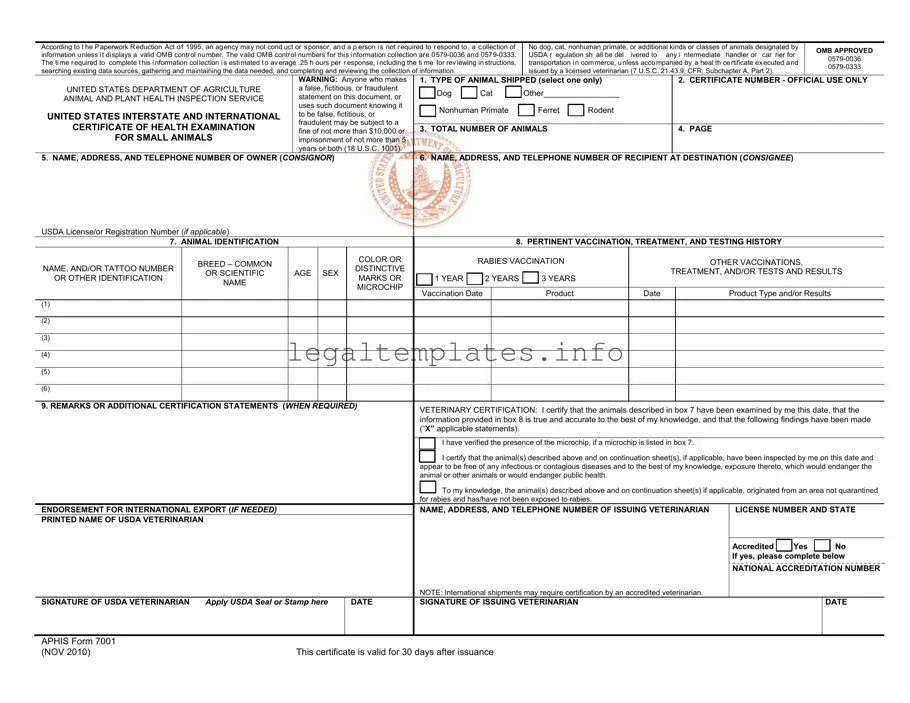What is the APHIS 7001 form?
The APHIS 7001 form, officially known as the United States Interstate and International Certificate of Health Examination for Small Animals, is a document required by the United States Department of Agriculture (USDA) Animal and Plant Health Inspection Service (APHIS) for the transportation of pets and other small animals across state or international borders. It certifies that the animal has been examined by a licensed veterinarian and is free from infectious or contagious diseases.
Who needs to fill out the APHIS 7001 form?
Any person or entity transporting dogs, cats, nonhuman primates, ferrets, rodents, or other animals designated by the USDA across state or international boundaries for commerce or any other purpose must fill out the APHIS 7001 form. This includes breeders, pet owners relocating, and organizations involved in animal trade or adoption.
How do I obtain the APHIS 7001 form?
The APHIS 7001 form can be obtained from the USDA's Animal and Plant Health Inspection Service website, veterinary offices that are certified to issue this form, or through certain pet relocation services. Ensure you are using the most current version of the form as outdated versions may not be accepted.
Is a veterinarian required to fill out the form?
Yes, the APHIS 7001 form must be completed and signed by a USDA-accredited veterinarian after a thorough examination of the animal(s). The vet will certify that, to the best of their knowledge, the animal is free from any infectious diseases that could endanger themselves, other animals, or public health.
How long is the APHIS 7001 form valid?
The certificate is valid for 30 days after the date of issuance. This means that travel must occur within this timeframe. After 30 days, the animal will need a new health examination and a new form will have to be issued for travel.
What information is required on the APHIS 7001 form?
The form requires detailed information about the animal(s) being transported, including the type of animal, breed, color or distinctive marks, vaccinations, treatments, tests and results, and microchip identification if applicable. It also includes information about the consignor (owner) and consignee (recipient), as well as the signature and accreditation details of the issuing veterinarian.
Are there penalties for falsifying information on the APHIS 7001 form?
Yes, anyone who makes a false, fictitious, or fraudulent statement on this document, or uses such document knowing it to be false, may be subject to a fine of not more than $10,000 or imprisonment of not more than 5 years, or both, according to 18 U.S.C. 1001.
Do I need an APHIS 7001 form for domestic flights within the United States?
While the APHIS 7001 form is primarily required for interstate and international travel, the requirements for domestic flights vary by airline. Some airlines may require a health certificate like the APHIS 7001 form even for domestic travel, so it is important to check with the airline beforehand.
Can the APHIS 7001 form be filled out electronically?
No, the APHIS 7001 form must be completed in ink and signed by the accredited veterinarian in their handwriting. Electronic signatures are not accepted. Make sure to keep the original document, as photocopies or digital versions may not be recognized during travel.
What happens if my pet travels without the APHIS 7001 form?
Traveling without the APHIS 7001 form or with incomplete or incorrect documentation can result in delays, quarantine, or even denial of entry for your pet at your destination. It is crucial to ensure that all required paperwork, including the APHIS 7001 form, is complete and accurate before travel.


